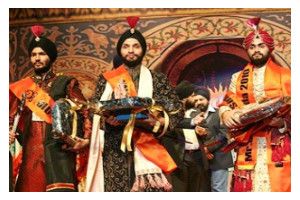Post by sparklekaz on May 6, 2012 21:17:32 GMT

Simran and Sewa. These are the "Foundation of Sikhism". It is the duty of every Sikh to practice Naam Simran daily and engage in Seva (selfless service) whenever there is a possibility- in Gurdwara; in community centre; old people's homes; care centres; major world disasters, etc.
Guru Nanak formalised these three aspects of Sikhism:
Naam Japna. A Sikh is to engage in a daily practice of meditation and Nitnem by reciting and chanting of God’s Name.
Kirat Karni. To live honestly and earn by ones physical and mental effort while accepting God's gifts and blessings. A Sikh has to live as a householder carrying out his or her duties and responsibilities to the full.
Vand Chakna. Sikhs are asked to share their wealth within the community and outside by giving Dasvand and practising charity (Daan). To “Share and consume together”.
The Sikh Gurus tell us that our mind and spirit are constantly being attacked by the Five Evils (or Five Thieves); Kam (Lust), Krodh (Rage), Lobh (Greed), Moh (Attachment) and Ahankar (Ego). A Sikh needs to constantly attack and overcome these five vices.[1]
The Sikh Gurus taught the Sikhs to develop and harness the Five Virtues which lead the soul closer to God and away from evil. These are Sat (Truth), Daya (Compassion), Santokh (Contentment), Nimrata (Humility) and Pyare (Love).
Sikh beliefs
1a. Naam Simran
1b. Sewa
2. Three Pillars
2a. Naam Japo
2b. Kirat Karo
2c. Vand Chhako
3. Five Evils
3a. Kaam (lust)
3b. Krodh (wrath)
3c. Lobh (greed)
3d. Moh (attachment)
3e. Hankaar (ego, pride)
4. Five Virtues
4a. Sat
4b. Santokh
4c. Daya
4d. Nimrata
4e. Pyaar
1) One Source - One God is the Creator of the Universe
2) Equality - All human beings are equal. People of all religions and races are welcome in Sikh Gurdwaras. Women have equal status with men in religious services and ceremonies
3) Human Life Precious Above Other Life
The human life is supreme and it is through this life that we can achieve oneness with God's will. Finding God in this life and living by his commands helps us to attain God's mercy.
4) Defending Against Injustice Sikhs are a peace loving people and stand for Truth and Justice. Guru Gobind Singh Ji said, "It is right to use force as a last resort when all other peaceful means fail."
These can be summed up in the Mool Mantar which is:
There is one creator Whose name is truth
Creative being
Without fear
Without hate
Timeless whose spirit is throughout the universe
Beyond the cycle of death and rebirth
Self-existent
By the grace of the guru
God is made known to humanity.
Chant and meditate on His name
True in the beginning, true now, and says Nanak, will be true forever
Guru Nanak formalised these three aspects of Sikhism:
Naam Japna. A Sikh is to engage in a daily practice of meditation and Nitnem by reciting and chanting of God’s Name.
Kirat Karni. To live honestly and earn by ones physical and mental effort while accepting God's gifts and blessings. A Sikh has to live as a householder carrying out his or her duties and responsibilities to the full.
Vand Chakna. Sikhs are asked to share their wealth within the community and outside by giving Dasvand and practising charity (Daan). To “Share and consume together”.
The Sikh Gurus tell us that our mind and spirit are constantly being attacked by the Five Evils (or Five Thieves); Kam (Lust), Krodh (Rage), Lobh (Greed), Moh (Attachment) and Ahankar (Ego). A Sikh needs to constantly attack and overcome these five vices.[1]
The Sikh Gurus taught the Sikhs to develop and harness the Five Virtues which lead the soul closer to God and away from evil. These are Sat (Truth), Daya (Compassion), Santokh (Contentment), Nimrata (Humility) and Pyare (Love).
Sikh beliefs
1a. Naam Simran
1b. Sewa
2. Three Pillars
2a. Naam Japo
2b. Kirat Karo
2c. Vand Chhako
3. Five Evils
3a. Kaam (lust)
3b. Krodh (wrath)
3c. Lobh (greed)
3d. Moh (attachment)
3e. Hankaar (ego, pride)
4. Five Virtues
4a. Sat
4b. Santokh
4c. Daya
4d. Nimrata
4e. Pyaar
1) One Source - One God is the Creator of the Universe
2) Equality - All human beings are equal. People of all religions and races are welcome in Sikh Gurdwaras. Women have equal status with men in religious services and ceremonies
3) Human Life Precious Above Other Life
The human life is supreme and it is through this life that we can achieve oneness with God's will. Finding God in this life and living by his commands helps us to attain God's mercy.
4) Defending Against Injustice Sikhs are a peace loving people and stand for Truth and Justice. Guru Gobind Singh Ji said, "It is right to use force as a last resort when all other peaceful means fail."
These can be summed up in the Mool Mantar which is:
There is one creator Whose name is truth
Creative being
Without fear
Without hate
Timeless whose spirit is throughout the universe
Beyond the cycle of death and rebirth
Self-existent
By the grace of the guru
God is made known to humanity.
Chant and meditate on His name
True in the beginning, true now, and says Nanak, will be true forever


